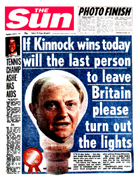 Tony Blair says he is "against the death penalty, whether it is Saddam or anybody else." Nevertheless, the Government appears content to allow Iraqi justice to take its inevitable course, and the former Iraqi dictator's days on earth are now surely numbered.
Tony Blair says he is "against the death penalty, whether it is Saddam or anybody else." Nevertheless, the Government appears content to allow Iraqi justice to take its inevitable course, and the former Iraqi dictator's days on earth are now surely numbered.The inconsistencies in the Government's supposedly "ethical" stance have already been well highlighted by Guido Fawkes. As one poster on Guido's blog put it: "If you are against the death penalty, you at least need to be consistent."
My consistent position, for what it's worth, is that I am against the death penalty, whether it be for a guilty man like Saddam Hussain or a wholly innocent one like Mirza Tahir Hussain.
As a Christian I believe that the only way to break the cycle of violence is not vengence, but forgiveness. It may sound idealistic, not of the real world, but in actual fact we see this principle played out again and again in the real world of international politics, and in life generally come to that.
Other interesting, thoughtful contributions from the blogosphere today - both for and against Saddam's execution - have come from:
Skipper
Mars Hill
John Wilkes
David Cox
Rachel from North London
I'm happy to go with this from Rachel: "Personally, I'm not comfortable with the death penalty. Even for crimes against humanity. He should rot in jail, thinking on what he has done. As should others, who cold-bloodedly ordered actions resulting in the deaths of thousands, based on ''policy'', posturing and lies."
November 7 Update: I really ought to add a link to this piece by Adam Boulton whose heroic questioning of the Prime Minister yesterday was broadcast journalism at its best.
Some have accused Adam of "rudeness" but they should remember that the Prime Minister was initially seeking to avoid giving an answer to the question by hiding behind Margaret Beckett's coat-tails. This was pretty shabby behaviour in my view from someone who has always prided himself on strong leadership and leading from the front, not least on the whole issue of Iraq.

